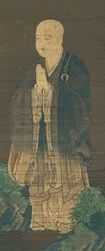Koso Wasan 63
Shan-tao appeared in the world in succeeding ages,
Manifesting himself as Fa-chao and Shao-k'ang,
And by revealing the treasury of virtues,
He fulfilled the Buddhas' fundamental intent.
The Road Goes Ever On... and On

The Road goes ever on and on
Far from the door where it began.
Now far ahead the Road has gone,
And I must follow, if I can,
Pursuing it with eager feet,
Until it joins some larger way
Where many paths and errands meet.
And whither then? I cannot say.
This is Bilbo's song from The Lord of the Rings. Bilbo is not in a hurry but has æons to fulfil his destiny. J.R.R. Tolkein's prescient story is told with the warmth and ambiguity that goes with genuine existence.
The verses on Shan-tao are full of temporal references, which remind us that nothing of worth is ever accomplished quickly. Even Shan-tao's mission was not completed in the span of one life-time. He appears age after age. In each of the two references given in this verse, it is to develop upon the liturgical practices that Shan-tao had introduced.
- 'Though a billion kalpas pass' - Koso Wasan, 64;
- 'Even when the time comes' - Koso Wasan, 65;
- 'We cast away living and dying forever' - Koso Wasan 76;
- 'Waiting for the moment when Faith' - Koso Wasan 77;
- 'Passing through kalpas measured by the atoms of the earth' - Koso Wasan 84;
- 'Aimlessly from the distant past' - Koso Wasan 85;
- 'We cast away long kalpas' - Koso Wasan 87.
No wonder it was widely understood in the Pure Land community that Shan-tao was himself from eternity. It also seems that Shan-tao was deeply conscious of the passage of time, the depth and significance of time. The references to time toll away throughout these hymns.
The Tathagata is eternally dwelling;
Dharmas are eternally abiding;
Our Parent's Great Compassion never changes
- Zuiken S. Inagaki
Shan-tao's consciousness of time lends an epic dimension to his insights and to his understanding. When this is added to his deep awareness of human nature, we become conscious of his sensitivity to the unfathomable depth of karmic evil and suffering - along with the profound burden undertaken by the Primal Vow, which is concommitant with the great stock of pain that besets every atom of the universe. In keeping with the ethos of the Buddha Dharma, in Shan-tao there is a sense of travel and of the passage of time. The world, beset for æons by suffering and karmic evil, waits in a reflective mood for the awakening of faith: 'firm and solid as a diamond'. We are waiting for refreshing and life-giving rain, to bring an end to an endless drought.
In keeping with his awareness of time, of one breath silently following another, of the sound of the wind in the trees and the passing of the seasons, year after year, Shan-tao created the liturgy known as ojo-raisan, or rokuji raisan - worship six times each day. Again, we are reminded of time passing, like a tolling bell.
We are not comfortable with the deep patience of the dharma, which is celebrated in Shan-tao's sense of time. We want instant answers, instant solutions, instant gratification. For Shan-tao this attitude would probably be quite bizarre, for what he failed to complete in one life he continued in the next. It is likewise for us. None of us should imagine that our remarkable connection with the Buddha-dharma came from 'left field'; for no reason and from nowhere. We have already encountered the dharma since the long distant past. Our wish to hear the dharma, now, is a culmination of long-ago factors, not something new.
The task of hearing the dharma and allowing the nembutsu to bear fruit in our hearts does not involve magic or quick solutions, either. Shinran selected the sutras and the commentaries of the dharma masters as the vehicles for our hearing and the guide book for our long, long journey. In reading the dharma, the masters come to us with new insights every day - some new discovery, some fresh joy.
And just as Shan-tao appeared in subsequent ages, so the dharma masters are our dear, compassionate friends. Whispering to us from the deep, deep timeless past of the eternal burden of suffering and the eternal work of the Primal Vow.